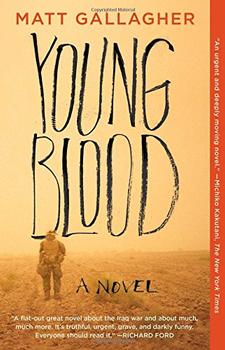Reading Guide Questions

Please be aware that this discussion guide will contain spoilers!
- Take a look at the epigraph, Stephen Crane's "In the Desert." Why do you think the author chose to open the book with this poem? How does it set the tone? Discuss how the poem affected you before you began the story, and how your understanding and appreciation of it have changed since finishing the novel.
- On pages 78 and 79, the American soldiers gather in the compound to witness a fight between a camel spider and a scorpion. Watching his soldiers, Lieutenant Porter thinks "I looked around and didn't see jaded boredom anymore but something else" (p. 77). What is it that Porter sees? Why do you think he chooses not to stop the fight?
- Consider the fight between the scorpion and the spider. What can you say about this moment in the novel, both as a storytelling device and for its significance within the plot? What is the author trying to say with this scene?
- After the fight, when Porter, having lost the bet, stands with Alphabet and the other soldiers drift away telling one another to "be the scorpion," Porter thinks to himself: "I couldn't shake the feeling that I'd just lost something important, something that mattered, even if it was just a pretense of that something" (p. 80). What is the narrator referring to, and how does this shape his character both as an individual and with respect to the other characters?
- The narrator recounts the story of his experience in training alongside his friend Randy Chiu, whom we later learn lost his legs in Afghanistan. Why does the narrator tell us this story? What is its significance in the greater context of the novel?
- On page 135, when the Barbie Kid is detained for assaulting Chambers, Porter thinks: "Our grandfathers had pushed back the onslaught of fascism. Just what the fuck were we doing?" The narrator's words are an interesting commentary on the evolution of American military identity, or at least the narrator's perception of military purpose. Do you think it's valid to assume that purpose in war is ever clearly defined, or is it more of a psychological mechanism?
- Driving through the desert countryside outside of Ashuriyah on page 204, Porter thinks to himself: "This is the desert . . . free and true. I took a gulp of Rip It from the back hatch and breathed in baked air and laughed because it didn't feel so strange anymore. None of it did." What is this change that comes over Lieutenant Porter, and what causes it? Is it simply the passage of time, or do you think it's triggered by a specific event?
- At the beginning of Ramadan, the narrator says: "I fasted through the holy month, alone among the occupiers" (p. 215). Why do you think Porter chooses to fast? Do you believe there is irony in his use of "holy month" or "occupiers" here? How?
- As the story progresses and Porter becomes more in touch with the local community, his thoughts on the war and his role in it start to shift. Discuss this transformation: Do you think his affection for Rana leads him to make excuses for people who would otherwise be considered dangerous? Or does his attitude stem from a more fundamental change in himself?
- Elijah Rios, or Shaba, is a phantom presence throughout the novel, and as Porter digs deeper into the mystery surrounding his death, the true nature of his character is frequently called into question. What do you think of Shaba's relationship with Rana? How would you define his relationship with Iraq? How do you distinguish the man that Rana knew from the one who fought alongside Chambers?
- Do you think Porter's dishonesty is justified in his attempt to help Rana and her sons, or does the crime involved negate the good intention behind the act? Is moral relativism symptomatic of war?
- Do you believe that Rana and her sons made it to Beirut? Why or why not?
Enhance Your Book Club
- War has inspired the lyrics of many poems and songs. The author of Youngblood chose to open his novel with verses, and the narrator's brother quotes a poem by Yeats on the Irish Revolution. Find other poems that deal with war and discuss them in the context of their inspiration and the themes of the book. Then, try writing your own poem based on your experience reading this novel, either from the perspective of Jack Porter or as a third-party observer.
- In the United States, we often read narratives from the American perspective. For your next meeting, read other works on the war in the Middle East written by Americans, such as Redeployment by Phil Klay, and talk about how the tone of those works compares and contrasts with that of Youngblood. Then, select works that are written from the Middle Eastern perspective, such as The Corpse Exhibition by Hassan Blasim or The Kite Runner by Khaled Hosseini, and discuss how the alternative perspective compares and contrasts with that of the books written by American authors. How does reading these books side by side shape your perception and understanding of the war?
- Author Matt Gallagher's storytelling style is frequently cinematic. How would you adapt this novel into a film? How would you represent the letters and official documents that appear throughout the book or invoke events from the past? Who would you cast in the main roles and why?
Unless otherwise stated, this discussion guide is reprinted with the permission of Washington Square Press.
Any page references refer to a USA edition of the book, usually the trade paperback version, and may vary in other editions.

 Book Reviewed by:
Book Reviewed by:





